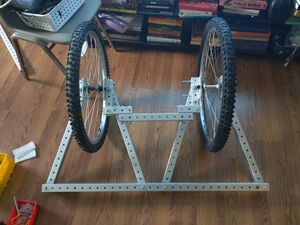Trapezoidal steering: Difference between revisions
From
No edit summary |
|||
| (5 intermediate revisions by the same user not shown) | |||
| Line 1: | Line 1: | ||
{{Techniques infobox | {{Techniques infobox | ||
|image = EFSW-cart-2.jpg | |image = EFSW-cart-2.jpg | ||
| | |designers = [[User:Tim|Timothy Schmidt]] | ||
|date = 2018 | |date = 2018 | ||
|vitamins = | |vitamins = | ||
| Line 11: | Line 11: | ||
|tools = [[Wrenches]] | |tools = [[Wrenches]] | ||
|git = | |git = | ||
| | |files = | ||
|suppliers = | |||
|reversible = true | |||
}} | }} | ||
| Line 20: | Line 22: | ||
=Challenges= | =Challenges= | ||
This configuration places a lot of stress on the wheel axles, which are essentially the fourth bar in a [[four bar linkages|four bar linkage]]. | |||
=Approaches= | =Approaches= | ||
| Line 25: | Line 28: | ||
EFSW-cart-2.jpg| | EFSW-cart-2.jpg| | ||
EFSW-cart-1.jpg| | EFSW-cart-1.jpg| | ||
Engineers for a Sustainable World.jpg| | |||
Engineers for a Sustainable World2.jpg| | |||
</gallery> | </gallery> | ||
Latest revision as of 10:09, 25 September 2021
Technique: Trapezoidal steering
| Reusability | Reversible |
|---|---|
| Designers: | Timothy Schmidt |
| Tools: | Wrenches |
| Parts: | Frames, Bolts, Nuts, End caps |
| Techniques: | Bolting, Live hinges |
Introduction
A steering linkage is the part of an automotive steering system that connects to the front wheels.
Challenges
This configuration places a lot of stress on the wheel axles, which are essentially the fourth bar in a four bar linkage.




